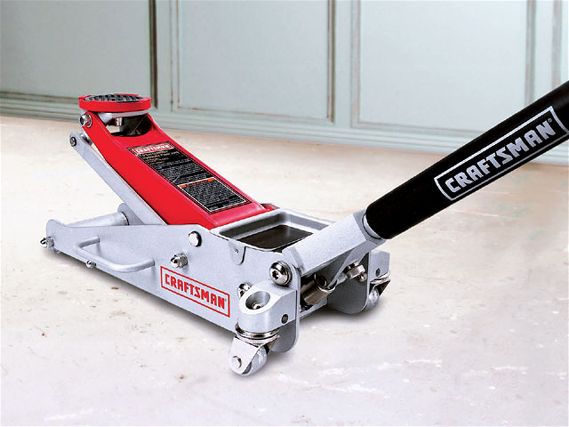 | Craftsman 4,000-lb Capacity Aluminum Jack - Tool Of The Month
| Craftsman 4,000-lb Capacity Aluminum Jack - Tool Of The Month
Track junkies-we all know them, and many of us are them. It starts with a few driving schools or maybe autocross events, progresses to driving schools that are farther away, and sometimes winds up as a full-blown racing sideline or even a career. Along the way, and in fact very early along the way, we learn the necessity of being able to place the car on four jack stands at the race track. Whether for servicing, swapping out street tires and wheels for track tires and wheels, bleeding brakes, changing brake pads, or even just to make sure those overheated R-compound tires don't flat spot after a hard run, being able to place the car on four jack stands is a turning point. It means you've gone from a dabbler to someone who is serious about the track.
Problem with all this is, it means carting a lot of stuff with you to track events. You've got your four, maybe five mounted track tires, and you can place one of them in the spare tire well. The other four? I always liked the roof, but then you need a roof rack. And they are easy to steal. The back seat, maybe. You've also got your "track tarpaulin," your tool box, oil, brake fluid, a compressed air tank for adjusting tire pressure, some spare parts, four jack stands, and a floor jack. Oh, and you might want to bring a change of clothes or two. Bottom line, that's a lot of weight to load into a car that probably has a lowered suspension to begin with. Add another person and before too long you're looking for ways to jettison weight.
Confession time: I stopped doing driving schools in the late 1990s for a myriad of reasons, but mainly money-it just got too expensive. I could not afford to absorb the loss of my car, at the time a 1991 BMW 318is. It was becoming ever more dangerous, as the events became populated by wild-eyed young physicians with 400 hp on tap, whose last car was a Honda Civic. I ran three events in three states in three weeks, and my dear late friend Mark Novak went along for moral support. Between the track stuff, him and me (not exactly lightweights, either of us), and our gear, the 318is was literally bottoming out the rear coil springs on big jounces as we sped from track to track. If I had stuck with the track addiction, I would have had to find serious ways to reduce weight, or take the next step and buy a tow trailer... and a truck to tow it with.
Your typical floor jack weighs anywhere from about 75 to 90 pounds, and some of the longer ones are even heavier. We found this cool new 44-pound aluminum jack on Craftsman's website for only $199.99. Yes, there are crappy aluminum jacks out there that sell for less, built in sweatshops in Asia, but Craftsman has long prided itself on standing for quality tools, and a quality tool is what you want in this case. Craftsman's Speedy-Lift(tm) design requires only two pumps to bring the saddle to the chassis. The unit lifts from 3.75 inches to 18.5 inches, which isn't much, so you'll want to bring along a block of pressure-treated wood if you want to get the car higher. The low-profile design allows easy pick-up and accessibility, and a handy magnetized tray keeps lug nuts and parts close at hand. It has a push-button two-piece handle for convenient storage, while a side and rear handle make for easy carrying and lifting into and out of the trunk.
